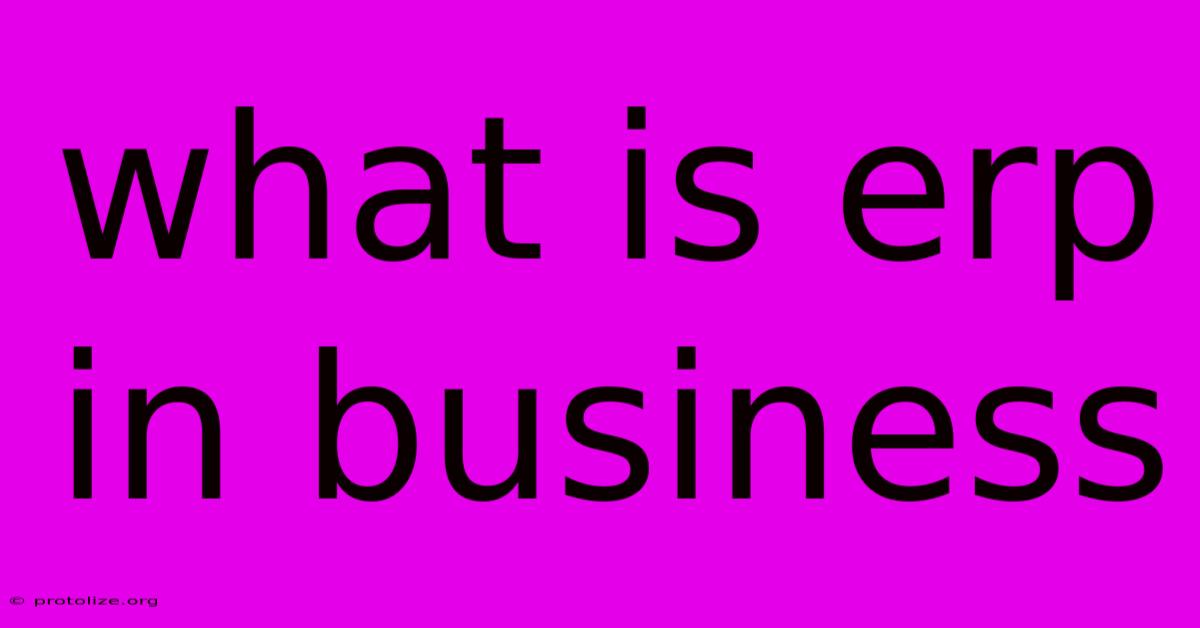What Is Erp In Business

Discover more detailed and exciting information on our website. Click the link below to start your adventure: Visit Best Website mr.cleine.com. Don't miss out!
Table of Contents
What is ERP in Business? A Comprehensive Guide
Enterprise Resource Planning (ERP) systems are the backbone of many successful modern businesses. But what exactly is an ERP system, and why are they so crucial for efficient operations? This comprehensive guide will demystify ERP, explaining its core functions, benefits, and considerations for implementation.
Understanding ERP: More Than Just Software
An ERP system is more than just software; it's a holistic approach to managing a business. It integrates all facets of an organization's operations, including planning, purchasing, inventory, sales, marketing, finance, human resources, and more, into a single, unified system. Think of it as a central nervous system for your entire business, connecting all the disparate parts and enabling seamless information flow.
Instead of using separate, independent systems for each department, an ERP system provides a centralized database, offering a single source of truth for all business data. This eliminates data silos, reduces errors caused by manual data entry, and enables informed decision-making based on real-time insights.
Core ERP Modules: The Building Blocks
Most ERP systems are modular, meaning they can be customized to fit the specific needs of a business. However, several core modules are common to most implementations:
- Financial Management: Handles accounting, budgeting, financial reporting, and financial consolidation.
- Human Capital Management (HCM): Manages employee information, payroll, benefits, recruitment, and performance management.
- Supply Chain Management (SCM): Oversees procurement, inventory management, logistics, and distribution.
- Customer Relationship Management (CRM): Manages customer interactions, sales processes, and marketing campaigns.
- Manufacturing: Manages production planning, scheduling, and quality control.
The Benefits of Implementing an ERP System
The advantages of using an ERP system are numerous and can significantly impact a business's bottom line. Here are some key benefits:
- Improved Efficiency and Productivity: Automating routine tasks frees up employees to focus on higher-value activities.
- Enhanced Collaboration: Real-time data sharing fosters better communication and collaboration across departments.
- Reduced Costs: Streamlined processes, reduced errors, and optimized inventory management contribute to significant cost savings.
- Better Decision-Making: Access to accurate, real-time data empowers informed decision-making at all levels of the organization.
- Increased Visibility and Control: Gain a comprehensive overview of your business operations, enabling proactive management and risk mitigation.
- Improved Customer Satisfaction: Faster order fulfillment, better inventory management, and improved customer service contribute to higher customer satisfaction.
- Scalability and Flexibility: ERP systems can grow and adapt as your business expands.
Choosing and Implementing an ERP System: Key Considerations
Implementing an ERP system is a significant undertaking. Careful planning and consideration are crucial for a successful deployment. Key factors to consider include:
- Business Needs: Identify your specific business requirements and choose an ERP system that aligns with your goals.
- Budget: ERP systems can range widely in cost, so it's crucial to establish a realistic budget.
- Integration: Ensure the ERP system seamlessly integrates with your existing systems.
- Vendor Selection: Thoroughly research and select a reputable ERP vendor with a proven track record.
- Training and Support: Invest in adequate training for your employees and secure ongoing support from your vendor.
Conclusion: ERP – A Strategic Investment for Growth
Implementing an Enterprise Resource Planning system is a strategic investment that can significantly improve a business's efficiency, profitability, and competitiveness. While it requires careful planning and execution, the long-term benefits far outweigh the initial challenges. By choosing the right ERP system and effectively managing its implementation, businesses can unlock their full potential and achieve sustainable growth. Understanding the core functionalities and benefits outlined above is crucial in making an informed decision about whether an ERP system is the right solution for your organization.

Thank you for visiting our website wich cover about What Is Erp In Business. We hope the information provided has been useful to you. Feel free to contact us if you have any questions or need further assistance. See you next time and dont miss to bookmark.
Featured Posts
-
Morris County Drone Crash Fact Check
Dec 13, 2024
-
Health Erp
Dec 13, 2024
-
Chess Grandmasters Costly Blunder
Dec 13, 2024
-
Open Ai Chat Gpt Back Online After Outage
Dec 13, 2024
-
Erp System Administrator
Dec 13, 2024
